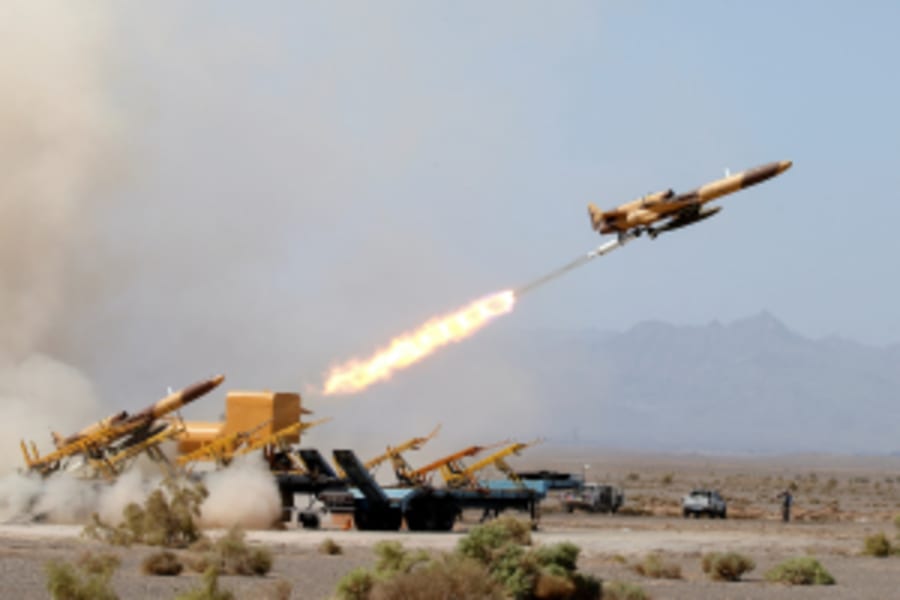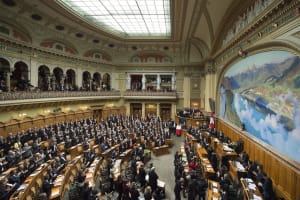Believe what I do, not what I say - Biden’s actions demonstrate that supporting Israel is not the goal
Part 1 of a two-part column

In this two-part column, I examine how Biden’s policy and treatment of Israel since October 7 demonstrate clearly that despite his words of support for Israel, his administration continues to support Iranian interests over the Jewish state, America’s most important Middle Eastern ally.
This Middle Eastern policy is a continuation of the policy of former President Barack Obama, which was meant to reset the power structure in the Middle East to allow for US withdrawal from the region. In reality, as I show here, what the policy has done is significantly degrade Middle Eastern security, and push the chances for peace between Israel and Arab countries further away. It also significantly degrades US and Western standing.
In the first part, I will focus on Biden’s treatment of Israel since the outbreak of the October 7 war, while in the second part, I will focus on how that policy compromises US and Western interests in the region.
Part 1 - The Biden "Bear Hug"
When US President Joseph Biden visited Israel shortly after the Hamas attacks of October 7, some described his visit as a “bear hug” to Israel, meant to indicate his support for the country after a dark day.
While Biden came with promises of support for “Israel’s right to defend itself,” a few voices warned that the “bear hug” was not meant to support Israel as much as to restrict it.
This assessment matches with previous actions by Biden. In 2021, during a flare-up in rocket attacks against Israel’s south by Palestinian terror groups, Biden used the same approach of promising to support Israel in order to build political credit to later call for Israel to rein in retaliatory measures.
In fact, this policy of Biden appears to be a continuation of the Obama policy, which sought to assuage Israel’s concerns by promising military support to Israel and continued friendship, while in practice restricting Israel’s freedom to operate, and creating a Middle East foreign policy at odds with Israel’s interests.
This analysis was first conducted by Michael Doran and Tony Badran in an article for Tablet Magazine called “The Realignment.”
Whatever the interpersonal issues between Prime Minister Benjamin Netanyahu, Israel’s longest-serving premier, and the various US presidents, Netanyahu has been consistent about one thing for the last 15 years – warning about the Iranian threat to Israel and the West.
Concerned about that threat, in a bold move, Netanyahu accepted a Republican invitation in 2015 to address a joint US Congress session regarding the dangers of Iran and the proposed Joint Comprehensive Plan of Action (JCPOA) being pushed by the administration of then-President Barack Obama.
Doran and Badran point to comments by former Obama Iran envoy Robert Malley, the driving force behind the disastrous JCPOA, speaking about indirect nuclear talks between the US and Iran in Vienna, who expressed the desire to ensure “that Iran enjoys the benefits that it was supposed to enjoy under the deal.”
In other words, Malley was more interested in Iranian interests than US interests. According to the authors, Malley was fully behind Obama’s vision for a new Middle East approach; an approach that would allow the US to withdraw from the area to focus on other concerns. Recognizing the power vacuum that would result from a US withdrawal, Obama sought to replace the US dominance with a local power. Instead of choosing a US-friendly country, such as Saudi Arabia, or even Israel, Obama chose Iran.
According to Malley, Obama’s goal was “to help the [Middle East] find a more stable balance of power that would make it less dependent on direct U.S. interference or protection.”
Malley was later placed on leave and had his security clearance suspended during an investigation into claims of an Iranian spy ring, in which Malley was suspected to have a part. Following the October 7 invasion, there were calls for further investigations.
The Obama administration did not heed Netanyahu’s warning, because it was pursuing a policy not only of appeasing Iran but in fact, strengthening Iran’s role in the Middle East despite evidence that Iran was continuing to be belligerent.
In 2018, Israel’s Mossad conducted a daring raid mission in Tehran, stealing thousands of nuclear archives, and exposing the duplicity of the Iranian government in failing to abide by the JCPOA terms even before President Trump pulled the US out of the agreement.
This impressive feat of field intelligence work, practically unparalleled in recent history, was rewarded by a continued cold shoulder from Obama, and by Obama's campaign staff coming to work against Netanyahu in Israeli elections.
With a brief hiatus during the Trump presidency, Biden has effectively continued Obama’s strategy towards Israel and the Middle East. His administration has been working to reinstate the JCPOA, despite its failure to curtail Iran’s nuclear ambitions or its financing of terror activities across the world. His policy has been that of rewarding and strengthening Iran, minimizing any open conflict with it or its proxies, and undermining the Western-friendly Arab nations that were beginning to pivot even more towards the US during the Trump administration.
If this assessment is correct, the tensions between the Biden administration and Netanyahu, despite verbally promising support, make sense. There is no way the Biden administration can partner with Iran while actively supporting Iran’s strongest opponent in the region, Israel.
The actions of the US government towards Israel since the October 7 war, demonstrate that this same policy appears to be at work even now.
While President Biden has openly been calling for a ceasefire for several months now, initially, he pushed the idea of a “pause” with the purpose of reaching a hostage agreement. However, the call for a pause quickly became a call for a ceasefire among Biden’s advisers.
Biden also started speaking of a humanitarian crisis in Gaza in mid-November, and by early December, was accusing Israel of “indiscriminate bombing.”
In fact, as time progressed, the Biden administration has begun adopting Hamas talking points, speaking of the “high” number of civilian casualties in Gaza without putting them in proper context. This came even as Biden himself already cast doubt on the casualty count from the Hamas-run Gaza Ministry of Health.
This Iran-focused policy also explains why Biden talks about the urgent need for humanitarian aid into Gaza to prevent “starvation,” despite the Israeli government providing proof that the amount of food aid entering Gaza is beyond the ability of humanitarian aid groups to distribute it. The facts on the ground are not important, the talk of a humanitarian crisis is needed to garner enough support to pressure Israel into ending the war without defeating Hamas.
It also explains why Biden has committed the US to building a pier in Gaza when there is no humanitarian justification for it. The pier’s construction, according to US estimates, will take about two months. By that time, the war could be over, and if people are actually starving, they would probably already be dead.
If getting food into Gaza were the real problem, the simplest solution is getting more trucks through the Israeli and Egyptian borders, opening more entrance points, as Israel recently did, and having security forces ensure proper distribution.
What the pier does, is provide an access point into the Gaza Strip that is not controlled by Israel. Israeli security forces will not be able to provide thorough searches of the aid entering the Gaza Strip via the pier, which the US has already said could be turned into a permanent port. And with Hamas demonstrating its ability to seize large amounts of aid coming into the Strip, it is not hard to imagine how the bringing of contraband items into Gaza would prolong the war effort, or allow the quick rebuilding of Hamas capabilities during a ceasefire.
The US has been pushing hard for a humanitarian ceasefire of at least six weeks, long enough to finish the pier. At that point, I suggest, the US will begin to allow some of its unnamed “ally and partner nations” – which it said would help build the pier and unload the humanitarian aid – to be revealed.
Most likely that is a reference to Qatar. The same Qatar that hosts senior Hamas leaders in Doha and has given millions of dollars to Hamas over the past few years.
According to military doctrine, piers like the Gaza pier are constructed when there is a lack of ports for delivering supplies and troops, or when ports are denied for use. Israel has plenty of ports in Ashkelon and Ashdod, close to Gaza, that could be used for bringing in humanitarian supplies. In fact, those ports, along with the port at Eilat, are already receiving aid for Gaza. That leaves port denial as the only reason. Israel would certainly deny the use of ports for transporting contraband items into Gaza.
In fact, a recent report in Israeli media claimed that USAID, which has been overseeing US humanitarian aid into Gaza, is going to hand control of the pier over to the Al Hissi Company. The Al Hissi company, owned by Yasser al Hissi, has been the primary supplier of engineering, electricity, and infrastructure for Hamas, and many of the municipalities, in Sejaeeya, Gaza City, Khan Younis, and other locales in the Gaza Strip. Al Hissi is controlled by Palestinian officers affiliated with Hamas.
If true, this would mean that the US is handing control of its “humanitarian pier” to a Hamas subsidiary. The US would not do this if it was interested in Israel defeating Hamas and establishing a terror-free regime in Gaza.
Finally, in regards to Gaza, Biden has been seeking to delay Israel’s entry into Rafah, where the last of the Hamas’ Gaza leadership is believed to be hiding out, and where most of the surviving hostages are probably being kept. This ensures that Israel cannot dismantle Iran’s primary local ally in its fight against Israel.
If reports coming out of Israeli media are true, even the recent IDF withdrawal from Khan Younis, appears to be under heavy US pressure to reach a hostage deal. However, the US has already made clear that it is pushing for a permanent ceasefire, not a temporary one, which would effectively end Israel's war against Hamas before achieving the strategic goal of eliminating Hamas as the government in Gaza.

J. Micah Hancock is a current Master’s student at the Hebrew University, pursuing a degree in Jewish History. Previously, he studied Biblical studies and journalism in his B.A. in the United States. He joined All Israel News as a reporter in 2022, and currently lives near Jerusalem with his wife and children.













